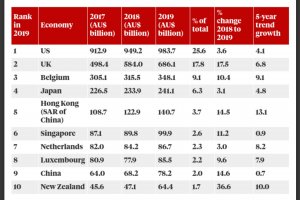Everyone thinks China is buying up Australia – but the USA is buying far more

.
.
.
.
.
Everyone thinks China is buying up Australia – but the USA is buying far more
In the 1960s and ‘70s the USA was purchasing Australia, then it was Japanese investment in the 1980s, and in 2019 China invested $78.2 billion in Australia.
But China’s $78.2 billion equates to only 2% of foreign capital invested into Australia for 2019, which is a mere fraction of the $983.7 billion received from USA investment.
The Treasurer Josh Frydenberg has proposed a turnaround in Australia’s Foreign Investment Review Board (FIRB) strategies and policing of foreign investment, which would be the biggest foreign investment reforms since 1975.
Frydenberg intends for foreign investors to face tougher scrutiny than in previous times, before they take a stake in Australian companies and resources, and this is a welcome announcement.
A 2019 study by independent think tank The Lowy Institute found 79% of Australians believe China’s infrastructure investments across Asia are part of a plan for “regional domination”.
The study also found 74% of Australians believe Australia is too economically dependent on China.
Those fears are far from unfounded though, with federal government banning Chinese-owned telco Huawei from providing parts for Australia’s 5G network.
The FIRB is responsible for ensuring the sale of Australian businesses, infrastructure, resources, and properties and it has attracted criticism from economists for quite some time now.
Australia Institute senior research fellow David Richardson cautioned in March the board’s track record on monitoring compliance “is poor” and a stronger monitoring role has never been “seriously pursued” by the organisation.
The new powers outlined by Treasurer Josh Frydenberg include screening investments with a new ‘security test’, penalties for investors who breach the conditions placed on their purchases by the FIRB, and ‘last resort’ powers enabling Treasury to dispose of some investments.
At the same time, however, these new powers are unlikely to scare off investors from pumping much needed capital into the country.
Source: Department of Foreign Affairs and Trade.
.
